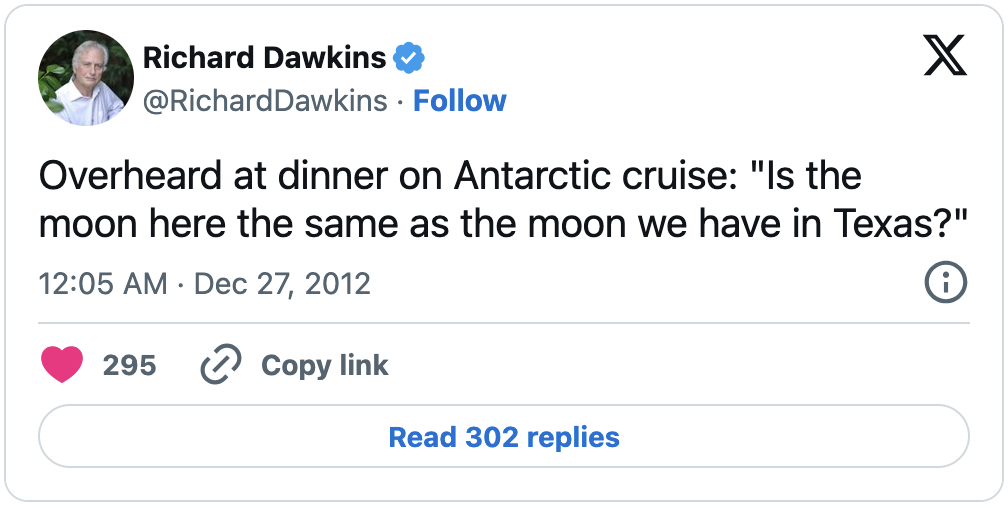Several years ago, I added a frequently asked questions section to the Friends of Charles Darwin website. When you follow Darwin-related conversations on the web, and when you run a Darwin-related website, the same frankly irritating questions have a habit of cropping up. Having an FAQ section allowed me to post links to the answers without having to type them out again and again.
One question posed with monotonous regularity goes something like:
If humans evolved from monkeys, how come there are still monkeys?
My response to this frequently asked question began as follows:
This is a spectacularly silly question, often posed by creationists…
My answer remained on the website for many years, attracting little feedback, apart from occasional, immediately trashed emails from random creationists who seemingly hadn’t read my request not to be contacted by them.
Then, last October, someone posted the following comment on my answer:
I do not think this is a silly question. If we evolved from apes, there would now not be any apes, if we are from the same species, we could reproduce with each other, but we can’t.
Something about this comment got to me. This was not some idiot wilfully misunderstanding Darwinian theory; this was someone who seemed genuinely confused. To them, it wasn’t a spectacularly silly question. Which made me feel bad about describing it as such.
I didn’t know what to do with the comment. I didn’t want to approve it, as I have a general policy of not approving comments perpetuating creationist mythinformation. But I didn’t want to trash it either. So it just sat there in my unapproved comments queue, niggling me every time I logged in.
Eventually, the niggling became too much for me. I decided to rewrite my answer (in the process of which, I learnt that my original answer was not strictly correct—so much for silly questions!). I then emailed the commenter a note with a link to the revised answer, and trashed their comment, as it was no longer relevant.
This whole experience got me thinking. I still do not wish (or intend) to engage in debates with hard-line creationists: life really is too short. But some otherwise reasonable and decent people clearly have genuine misunderstandings about evolution and other scientific matters. Dismissing their questions as ‘silly’ (or ‘stupid’) is not going to win anyone over to the cause. Naïve questions ought to be treated as opportunities to express ideas clearly—and hopefully to enlighten. In the case of revising my FAQ answer, the process also ended up enlightening me: I now know more about monkey evolution than I did previously.
With a new-found, self-righteous determination to treat naïve questions more seriously, shortly after Christmas, I was disappointed to see the following tweet from whoever tweets on behalf of Richard Dawkins [Postscript: Oh, apparently Richard Dawkins does his own tweets these days]:

Yes, it seems like an amusingly stupid question. But is it really? Of course there is only one moon, but the moon in Antarctica is different to the moon in Texas in a number of ways. As I tweeted back to @RichardDawkins:
No, it’s upside-down.
Not only is the Antarctic moon (pretty much) upside-down compared to how it looks in Texas, but, if you observe it long enough, you will see it cross the sky from right to left; not left to right, as it does in Texas. And it will appear lower in the sky. All of which are fun and interesting observations. I think @RichardDawkins missed an opportunity to explain to the Texan how being in the southern hemisphere affects one’s perspective (pace, Wilkins).
So, one of my New Year’s resolutions is to try to treat naïve questions more seriously. Which I guess, amongst other things, means I’m going to have to revisit my other frequently asked questions.
But the good news is that my resolution is already paying dividends. Last night, I was at a large dinner-party with my partner Jen’s family. I don’t know how the conversation turned to Darwin—it usually does when I’m around—but Jen’s mum, who is a devout catholic, suddenly asked me why, if we are descended from monkeys, there are still monkeys around. I answered her using the analogy of her two daughters (who were sitting next to her), observing how they are both descended from her, but that she is still around! I could almost hear the penny drop, and was rewarded with the best response I could have hoped for:
You’re starting to convince me, Richard!

Leave a Reply to Richard Carter, FCD Cancel reply